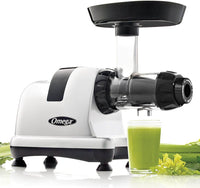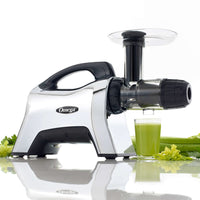Cold Pressed Juicer vs Centrifugal Juicer - Which Is Better?

What is the difference between a Centrifugal juicer and a Cold-pressed juicer?
Here at Love Your Health, we do see this question come up regularly and because we sell juicers, and are big fans of juicing and its benefits, we thought we would provide more information on the difference between the two.
When we talk about cold pressed juice vs normal juice from a centrifugal juicer, the significant difference is the technique used to extract the juice. The fast-spinning blade of a normal juicer tends to lose most essential nutrients of juice, where cold pressed juice gives maximum yield by retaining high nutrients.
Let’s take a closer look at the differences between the two.

The Centrifugal Juicer
This juicer is usually found in most cafés and juice bars. Centrifugal juicers are typically fast moving and have metal blades that spin against a mesh filter with speeds ranging between 1,000 RPM through to 30,000 RPM, which separates the juice via centrifugal force. These fast-moving blades can take on a whole apple or carrot without having to chop them into little pieces. The blades also generate heat which can oxidize and destroy some of the enzymes and nutrients in the fruit and vegetable produce that is being juiced, shortening the life of the juice to varying degrees, which is why cold-pressed juices are far more nutritious than a regular juice.
Unfortunately, centrifugal juicers also do not juice leafy green vegetables very well and much of it ends up as pulp waste. However, cold press juicers are more effective at juicing and extracting nutrients from produce like kale, spinach, herbs like mint and parsley, and wheatgrass.
Pros:
- Usually cheaper in price
- Fast at producing juice
- Efficient and less preparation time because you don’t always have to cut or dice the produce to put through the machine
Cons:
- Requires regular pulp removal and cleaning
- Cannot juice wheatgrass of leafy green vegetables efficiently and economically
- Fairly noisy because the internal components move at a high rate of speed, which creates friction and vibration
- Yields a larger amount of juice pulp – more waste, less juice
- Produces quite a bit of juice froth on top of the juice
- Will only juice as a single function and cannot do the variety of things like make pasta, sorbet, and even nut milk and nut butters
It should also be mentioned that you can’t really store the juice made with centrifugal juicers like you can for a few days with a cold-pressed juicer. Due to the faster oxidation process in a juice produced by a centrifugal juicer, the juice really must be consumed straight away.

The Cold Pressed Juicer
Cold press juicers are juice extractors that extract juice from your produce via slow speed ‘cold press’ masticating process. They use a juicing part called an ‘auger’ which grinds and chews up the fruit and vegetable produce, and then pushes through a strainer which separates the juice from the pulp.Cold press juicers are juice extractors that extract juice from your produce via slow speed ‘cold press’ masticating process. They use a juicing part called an ‘auger’ which grinds and chews up the fruit and vegetable produce, and then pushes through a strainer which separates the juice from the pulp.
These juicers take approximately 5 minutes to prepare a juice at the speed of 80 RPM. Because there is no heat generated by blades, the nutrients are preserved, the juice tastes stronger and of high quality with less pulp and can be kept in the refrigerator to be consumed later (up to 72 hours).
Pros:
- Less pulp than a centrifugal juice
- Almost silent and less noise (this makes the juicers suitable for use in environments that don’t allow noise)
- Warranty cover for most cold-pressed juicers (for example, our Omega juicers have a 20 year warranty on the motor and a 10 year warranty on the juicer parts)
- Can break down nuts to make nut milks and nut butters
- Can also create a variety of things like sorbets, bliss balls and pasta
- Less pulp and more juice
- More nutrients in juice as there is no oxidation process
- Has the advantage of juicing wheatgrass and leafy green vegetables more efficiently
Cons:
- Can be slightly more expensive than a centrifugal juicer
- A slower juicing process
- More preparation as the ingredients do need to be chopped into smaller pieces to go through extraction

The verdict
The fast-spinning blade of a normal juicer tends to lose more essential nutrients of juice, where cold pressed juice gives maximum yield by retaining high nutrients.
The difference between juice from a centrifugal juicer and the juice from a cold-pressed juicer can easily be shown by standing a glass of juice from either of these juicers. While cold pressed juice starts to naturally separate after time, juice produced from a centrifugal juicer begins to separate almost immediately due to oxidation during the extraction process. The juice from the conventional centrifugal juicer will go slightly browner in colour and separate much more sooner than the cold-pressed juice.

Which cold pressed juicer do we recommend?
When it comes to cold press juicers, our top recommended brand at Love Your Health is Omega, which is available from our online store.
The MM900HDS machine comes with a celery juice attachment that increases celery juice yields. This is perfect for those who are following the 'Medical Medium protocol' or celery juice cleanse and will be juicing celery on a regular basis, but it is also great for all other ingredients too.

The Omega NC1002HDC cold pressed juicer comes with a slightly wider chute, is great for all ingredients and will provide fantastic yields with produce like beetroot, carrots, celery and more. This machine also comes with the attachment that allows you to make other raw food recipes such as bliss balls, nut butters, frozen desserts and many other favourites, all of which can be found in its included comprehensive guide.

The J8227 & J8228 have sold more than any other over the last 3 years and the feedback speaks for itself.

If you need some extra assistance or have any further questions about juicers, we would be more than happy to help. Please feel free to connect with us through our contact form on our website, or give us a call today on (02) 8880 0749.

Omega MM900HDS Cold Pressed Celery Juicer
- Regular price
- $649.00
- Sale price
- $649.00
- Regular price
-
- Unit price
- per

Omega NC1002HDC Cold Pressed Juicer
- Regular price
- $649.00
- Sale price
- $649.00
- Regular price
-
$679.00 - Unit price
- per